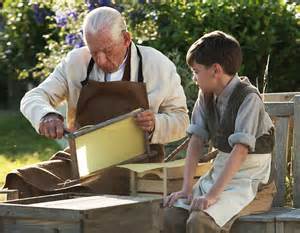Prickly Ash For The Treatment of Senility Did Work!
Sherlock Holmes struggles with memory loss as he tries to remember the particulars of the last case he solved and the reason why he retired his career as a detective. His last days are spent near the White Cliffs on the ocean shore outside of London as we knew Homes. There, he tends to honey bees primarily for the Royal Jelly in a vain attempt to restore his failing memory. His last effort for memory salvation is a rare plant known only to grow in Japan called the Prickly Ash. Here in North America grows the tree form, but in freshly bombed out Hiroshima, it’s a small herbal plant that in the film seems to be the only living thing in the aftermath of a charred out nuclear blast zone.
MR. HOLMES is a new twist on the world’s most famous detective. 1947, an aging Sherlock Holmes returns from a journey to Japan, where, in search of a rare plant with powerful restorative qualities, he has witnessed the devastation of nuclear warfare. Now, in his remote seaside farmhouse, Holmes faces the end of his days tending to his bees, with only the company of his housekeeper and her young son pervasive prodding, Roger. Grappling with the diminishing powers of his mind, Holmes comes to rely upon the boy as he revisits the circumstances of the unsolved case that forced him into retirement, and searches for answers to the mysteries of life and love – before it’s too late.
Is the movie MR HOLMES thwarting our intellect with deception?
Yes. The clue is that the film is a faithful adaptation of Mitch Cullin’s 2005 novel “A Slight Trick of the Mind”. What it’s doing is tricking the mind of the viewer.
In the film, Sherlock Holmes admits that the healing effect of both royal jelly harvested from his bee hives and the prickly ash he brings back from Japan did not work.  He attributes the restoration of his short term memory loss as well as the memory of his last case to the house keeper’s son, Roger, who helps Holmes invigorate his memory. In the final scenes, Sherlock Holmes memory block is unlocked as he vividly remembers the circumstances of the case therefore finishing his memoir in the form of a story.
He attributes the restoration of his short term memory loss as well as the memory of his last case to the house keeper’s son, Roger, who helps Holmes invigorate his memory. In the final scenes, Sherlock Holmes memory block is unlocked as he vividly remembers the circumstances of the case therefore finishing his memoir in the form of a story.
After having practiced the craft of investigation throughout my career as a crime analyst, it’s important for me to realize that I cannot exclude evidence as I observe them. I’ve proven that Hollywood film making and in the books they are adapted from are testament to subtlety with a profound effect of deception. The film Hunger Games in which Katniss Everdeen receives a synthetic ointment that heals third degree burns over night in truth comes from the bark of the “Miracle Skin Tree” called Tepezcohuite from Oaxaca, Mexico. I enjoyed this film more than most over the years with the notion that finally, I wasn’t forced into an investigation. Invariably, it turned into an investigation into an historical investigator and behind that, the psychological dynamics powered by Hollywood’s media psyops. “A treatment for burns that works faster than Hollywood’s version”.
The audience is lead to believe that Mr. Holmes was accurate in saying that the natural remedy was worthless, however, his mental faculties brought back and the fact he is the world’s finest evaluator of mysteries to solve them, it is in the very last scene that he rejoices. This is a statement in my opinion that he knows that the effect of the medicine from the Prickly Ash taken subcutaneously was the answer.
The miracle plant is only found at a nuclear ground zero?
Two years after in 1947 the cinematographers elude visually that fire still rage in the ashes of the devastated and still smoldering grounds outlining Hiroshima. This scene’s intention is to imprint in ones mind that the exotic plant is contaminated with radiation residue which does two predominant things. It suggests to the viewer that even if there is such thing as a prickly ash herb that it thrives only in Hiroshima and that it no longer is effective. How they accomplished this was by showing us that the Japanese client is not honest about his story which by guilt through association, that the story of the plant is also either a myth or untrue entirely.
Another question is why the name of the plant is exactly like the Prickly Ash tree of North America? The tree has healing properties, but not for reversing memory loss. Prickly Ash’s traditional use was to stimulate the body when it was feeling sluggish and that was the trait of a 93 year old aging man in Mr. Holmes. Not one mention of the world renowned herb, Ginkgo Biloba, or any others was mentioned. It would be obvious Sherlock Holmes would have tried them all. A reason that most likely occurred was for the film makers to keep any natural alternatives that do exist from the audience and any that could come to awareness a bad stigma.. or just create skepticism. Moreover, there may be an herbal remedy that truly is rare, but thrives in another part of the world with the same healing effect noted in the movie Mr. Holmes if indeed the effect did take place and not assumed to be induced by a young sleuthing protege.
.
Lnbracker@hushmail.com
.
.

